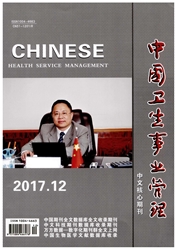

 中文摘要:
中文摘要:
目的:探讨提高乡村医生工作积极性的激励策略。方法:运用定性与定量相结合的方法,定性调查采用个人深入访谈为主,定量调查采用问卷调查法,以课题组编制的乡村医生调查表为测量工具,对山东省6市18县54个乡镇的1018名乡村医生进行调查,采用描述性分析、路径分析对定量资料进行分析,结果:乡村医生生存状况得分较低,其次是成长状况,关系状况得分最高。生存对工作满意度作用最大,路径系数为0.41,其次为关系,路径系数为0.21,再次为成长,路径系数为0.15。结论:激励乡村医生目前应以改善其生存状况为主。
 英文摘要:
英文摘要:
Objective To explore the incentive dcmands of rural doctors. Methods Using qualitative and quantitative methods to study. Personal in - depth interviews was mainly used about qualitative method and questionnaire survey was mainly used about quantitative method. A multi -step random sample of 1018 rural doctors from six cities eighteen counties fifty- four townships of Shandong Province was selected and assessed with rural doctor questionnaire. Adopting descriptive analysis and path analysis to analyze data. Results The score of survival status was lowest, followed by the growth status, the score of relationship status was highest. The survival status plays the most important role in job satisfaction, the path coefficient is 0. 41. Followed by relationship status, the path coefficient is 0. 21. Growth status has minimal effect on job satisfaetion, the path coefficient is 0. 15. Conclusion The survival needs should be improved first to encourage rural doctors.
 同期刊论文项目
同期刊论文项目
 同项目期刊论文
同项目期刊论文
 期刊信息
期刊信息
